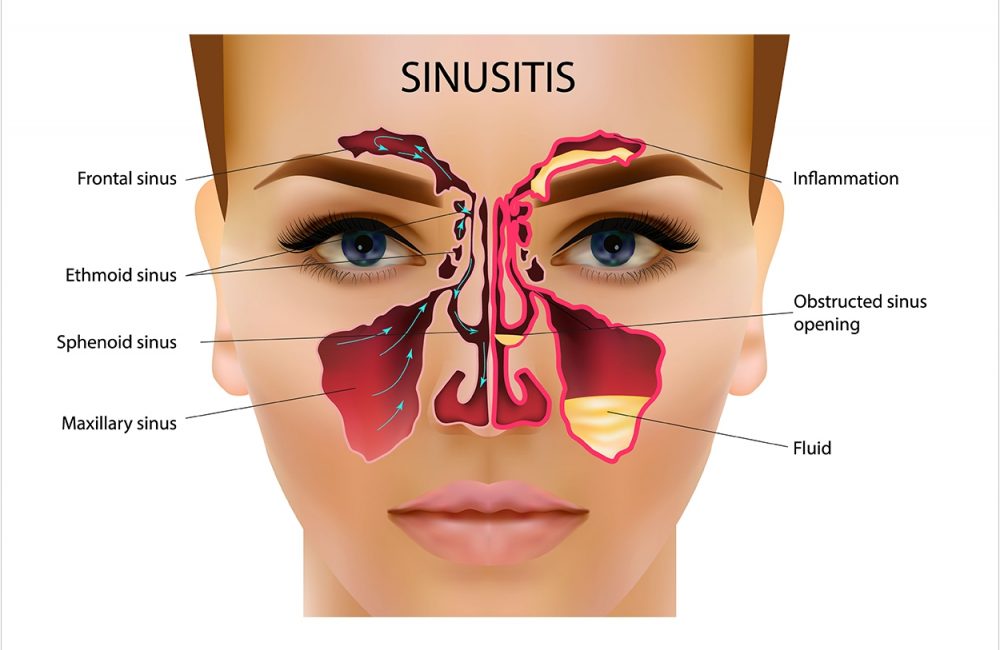Sinusitis is a common medical condition that affects millions of people all over the world. It’s an inflammation of the sinuses, whch can be caused by a variety of factors, including allergies, colds and viruses, or even structural problems in the nasal passages. While sinusitis is usually not serious and can be treated with medications like antibiotics or anti-inflammatory drugs, it can cause unpleasant symptoms like headaches, facial pain and congestion.
But one symptom that many people don’t realize can be caused by sinusitis is numbness in the face. This isn’t as common as other sinusitis symptoms, but if you have persistent numbness in your face or mouth that doesn’t go away with traditional treatments for sinusitis, it could be a sign that something else is going on.
So why does sinusitis cause numbness? In some cases, mild sphenoid sinusitis can cause inflammation to spread to the maxillary nerve if no bony boundary exists between it and the sphenoid sinus. In addition, viral and bacterial infections can also lead to numbness in the face if they become severe enough. Other potential causes include blocked saliva glands and dental problems such as infections underneath your gums or at the root of your teeth.
If you experience any facial numbness that lasts longer than a few days or seems to be getting worse despite traditional treatments for sinusitis, you should talk to your doctor about it right away. They may need to do further tests or scans to figure out what’s going on and determine how best to treat it.
In conclusion, while facial numbness isn’t a common symptom of sinusitis, it is possible for severe cases or underlying conditions to lead to this issue. If you experience any persistent numbness in your face along with other symptoms of sinusitis such as congestion and headaches, make sure to talk to your doctor about it so they can properly diagnose and treat any potential underlying issues.
The Impact of Sinuses on Facial Nerves
Yes, sinuses can affect facial nerves. The sinuses are a group of air-filled cavities located in the skull, and their primary purpose is to filter and humidify the air that flows through them as you breathe. If one or more of the sinuses becomes infected or blocked due to an illness such as a cold or allergies, it can lead to inflammation that can spread to the facial nerves. This type of infection is called sinusitis and can cause pain, pressure, and other symptoms in the face. In severe cases, it may even cause paralysis of certan muscles in the face. Treatment for sinusitis typically involves antibiotics or other medications to reduce inflammation and clear out any blockages in the sinuses.

The Causes of Facial Numbness
A numb feeling in the face can be caused by a variety of conditions, ranging from viral and bacterial infections to dental problems. Viral and bacterial infections can cause facial numbness due to inflammation of the nerves that supply sensation to your face. Dental problems, such as an infection underneath your gums or at the roots of your teeth, can also cause this symptom. Other possible causs include blocked saliva glands and shingles; both of these conditions often result in a feeling of numbness over one side or all over your face. Additionally, certain medications or medical treatments may lead to facial numbness as a side effect. If you experience facial numbness, it is important to speak with your doctor to determine the underlying cause.
The Effects of Sinusitis on Head Numbness
Yes, sinusitis can cause head numbness. When the sinuses become swollen and inflamed from infections such as colds, flus, and sinusitis, they can compress nearby nerves which can lead to head tingling or numbness. This numbness may be felt in the face, head, or neck. Other symptoms of sinusitis can include coughing, headache, fatigue, facial pain or pressure and congestion or runny nose. If you experience any of these symptoms for more than a week it is important to talk to your doctor about possible treatments.
How Can Sinus Issues Impact Facial Features?
Yes, sinuses can affect your face. Acute sinusitis is an inflammation of the sinuses that can cause facial pain and pressure, swelling around the eyes, congestion in the nose, and a headache. Symptoms may be worse when bending forward or lying down. Sinusitis can also cause a sore throat or coughing from postnasal drip. In rare cases, it can lead to vision changes or an infection around the eye socket.
Can Sinusitis Lead to Facial Paralysis?
Yes, there is evidence to suggest that sinusitis can cause facial paralysis. Transient inflammatory paranasal sinus disease, caused by a viral or bacterial infection, has been linked to Bell’s palsy, a form of facial paralysis. It is thought that the inflammation associated with the infection affects the nerves in the face, causing paralysis. Although this relationship is still uncertain, it is important to seek medical attention if you experience facial paralysis in order to rule out any underlying causes such as sinusitis.

Source: crest.com
Signs That Sinus Infection Has Spread to the Brain
If sinusitis has spread to the brain, some of the most common signs and symptoms include changes in vision, a sense of numbness, difficulty speaking, and severe headaches inside the skull. Visual disturbances can include blurred vision or double vision. Numbness may be felt on one side of the face, while difficulty speaking can include slurred speech. Severe headaches inside the skull can be accompanied by nausea and vomiting. Other neurological symptoms that may indicae sinusitis has spread to the brain include an altered mental state such as confusion or disorientation, seizures, facial paralysis and hearing loss. If you experience any of these symptoms it is important to contact your doctor immediately for diagnosis and treatment.
Is Facial Numbness a Cause for Concern?
If your face is feeling numb, it is important to determine the cause so that you can take the appropriate steps. In some cases, it may be due to a mild allergic reaction or simply being very cold. However, if you are also experiencing other symptoms such as fatigue, dizziness, difficulty speaking or walking, or loss of vision and/or sensation in other parts of your body then this could indicate a more serious underlying medical condition and you should seek medical advice from your doctor.
The Severity of Facial Numbness
Facial numbness can be an indication of a serious medical condition, so it is important to seek medical attention if you are experiencing facial numbness. Conditions like Bell’s palsy, multiple sclerosis (MS), or stroke can cause facial numbness on the right side. While not all cases of facial numbness are serious, it is best to have a doctor evaluate your symptoms in order to rule out any potential underlying causes. Treatment may include medications or physical therapy depending on the cause and severity of the condition.
Treating Facial Numbness
Unfortunately, there is no surefire way to get rid of numbness in the face. The best approach is to manage the symptoms associated with facial numbness. Over-the-counter pain medications, prescription painkillers, and corticosteroids can be used to relieve any discomfort or pain associated with the numbness. In some cases, the numbness may go away on its own without any treatment. However, it is important to see a doctor if the numbness persists for more than a few days or if you experience any other unusual symptoms.

The Relationship Between Sinusitis and Neurological Problems
Yes, sinusitis can cause neurological problems. Sinusitis is an infection or inflammation of the sinuses and can both acutely and chronically give rise to a wide range of intracranial and orbital complications. These complications may include brain abscess, subdural empyema, epidural abscess, meningitis, venous sinus thrombosis, frontal bone osteomyelitis, and orbital cellulitis and abscess. Brain abscess is an infection in the brain that is usually caused by bacteria from the nose or throat entering the cranial cavity. Subdural empyema occurs when pus accumulates beteen the surface of the cranial dura mater and underlying brain tissue. Epidural abscess occurs when pus accumulates between the dura mater and skull bones. Meningitis is an infection of the protective membranes covering the brain and spinal cord that can lead to swelling of the tissue surrounding them. Venous sinus thrombosis is a blockage of one or more veins in the skull due to a blood clot which can lead to increased pressure within these veins causing headaches and nausea. Frontal bone osteomyelitis is an infection of a portion of the frontal bone which can result in pain in that area as well as symptoms such as fever and weakness on one side of the face or body. Orbital cellulitis and abscess are infections located within in the orbit which can lead to bulging eyes, double vision, pain with eye movement, swelling around eyes, fever and headache. All these complications have potential for serious neurological damage if not treated promptly with antibiotics or surgery if necessary.
The Relationship Between Sinus Issues and Neurological Issues
Yes, sinus issues can potentially be neurological in nature. Sinusitis, an infection of the paranasal sinuses, can cause inflammation which can lead to compression of the nerves and blood vessels in the area. This compression can then lead to a variety of neurological symptoms such as facial pain or numbness, impaired sense of smell, vision changes, headaches, dizziness, and even changes in behavior or cognition. Therefore, it is important to consider the possibility of neurological complications when diagnosing and treating serious infections in the paranasal sinuses.
The Effects of Sinus Problems on Mental Well-Being
Yes, sinus problems can make your head feel weird. Sinus infections and other sinus problems can cause pressure and pain in your forehead and around your eyes, as well as nasal congestion, runny nose, postnasal drip, and a feeling of fullness in your ears. In addition to the physical symptoms, some people also experience fatigue, dizziness, and difficulty concentrating. If your headache is accompanied by these symptoms it could be a sign of a sinus infection or other sinus problem. If you are experiencing any of these symptoms it is important to see your doctor for diagnosis and treatment.
Symptoms of Sinusitis
The four main symptoms of sinusitis are postnasal drainage, congestion, facial pain and swelling, and a reduced sense of smell and taste. Postnasal drainage is a feeling of drainage down the back of the throat. Congestion is a feeling of being blocked or stuffy in the nose, making it difficult to breathe through your nose. Pain, tenderness, and swelling around the eyes, cheeks, nose or forehead can be experienced with sinusitis. Lastly, there may be a reduced sense of smell and taste due to inflammation in the sinuses.

The Effects of Sinus Pressure on Facial Tightness
Yes, sinus pressure can caue facial tightness. Sinus pressure is caused when the air-filled cavities around the nose become inflamed or swollen due to allergies, a common cold, or an infection. This inflammation causes a buildup of mucous in the sinuses and puts pressure on the surrounding areas. The facial tightness is often felt in the forehead, cheeks, and jaw area as a result of this increased pressure. Other symptoms of sinus pressure can include headaches, nasal congestion, fatigue and difficulty breathing. Treatment may include taking over-the-counter medications such as decongestants and antihistamines, using saline nasal sprays or humidifiers to help clear out mucous, or consulting with a doctor to determine if antibiotics are needed to clear up an infection.
What Does Sinus Pressure in the Face Feel Like?
Sinus pressure in the face can feel like an overall aching or throbbing sensation, particularly around the forehead and around the eyes. It may also be accompanied by a feeling of pressure or fullness in the area affected. You may also experience pain when you press on certain areas of your face, such as your cheeks, due to inflammation and congestion in the sinuses. In addition, you may experience a stuffy nose, a runny nose, sneezing or coughing due to sinus congestion.
Conclusion
In conclusion, sinusitis is an inflammation of the sinuses caused by bacterial or viral infections. Symptoms can range from mild to severe and may include facial swelling, head tingling, throbbing facial pain, and difficulty breathing through the nose. It can also cause inflammation to spread to the maxillary nerve if no bony boundary exists between it and the sphenoid sinus. Treatment depends on the underlying cause, but may involve antibiotics or other medications to reduce swelling and help clear up the infection.
